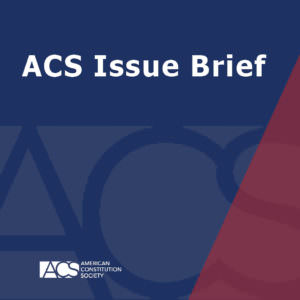The Roberts Court and the Future of the Exclusionary Rule
Emeritus Centennial Distinguished Professor of Law, DePaul University College of Law

ACS is pleased to distribute "The Roberts Court and the Future of the Exclusionary Rule," an Issue Brief by Susan A. Bandes, Distinguished Research Professor at the DePaul University College of Law. Since the Supreme Court decided Mapp v. Ohio in 1961, the exclusionary rule has been the primary method of enforcing against state and local law enforcement officers the Fourth Amendment's right to be free from unreasonable searches and seizures. The exclusionary rule had previously been applied to federal law enforcement officials, but as Professor Bandes argues, "the Court's broad expansion of Fourth Amendment protection ignited a heated debate over the proper remedy for a violation of the right - a debate that continues to this day." She discusses the objections to the exclusionary rule, which are based on the high price it imposes on the government by prohibiting the use in court of evidence obtained in violation of the Fourth Amendment. Professor Bandes continues by explaining that, "The exclusionary rule excludes evidence that would never have been acquired if the police had obeyed the Fourth Amendment in the first place. Thus the controversial nature of the remedy has much to do with the controversial nature of the underlying right. The Fourth Amendment imposes constraints on law enforcement officials in order to protect individual autonomy and dignity."
Based on changes in police practices that followed the Court's decision in Mapp, moreover, Professor Bandes asserts that "it has become apparent that the exclusionary rule is an essential means of ensuring that law enforcement officers respect the limits the Fourth Amendment imposes on their power." She also points out that the Mapp Court itself reasoned that "the government should neither profit from its own illegal activity nor model disrespect for the law through its own actions." Nevertheless, she argues that the Roberts Court has issued decisions that have weakened the exclusionary rule and even suggested that is it obsolete and no longer needed. Professor Bandes contends that these decisions are the logical extension of an effort that began in the Reagan-era Justice Department, led by then Attorney General Edwin Meese, to launch the first frontal attack on the exclusionary rule. She concludes by observing that, "Chief Justice John Roberts and Justice Samuel Alito, both of whom served in the Meese Justice Department, are now part of a four-member voting block (with Justices Antonin Scalia and Clarence Thomas) that, to all appearances, is busily laying the groundwork for abandoning the exclusionary rule. They lack only a reliable fifth vote."
Read the full Issue Brief here: The Roberts Court and the Future of the Exclusionary Rule
